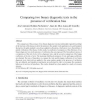Free Online Productivity Tools
i2Speak
i2Symbol
i2OCR
iTex2Img
iWeb2Print
iWeb2Shot
i2Type
iPdf2Split
iPdf2Merge
i2Bopomofo
i2Arabic
i2Style
i2Image
i2PDF
iLatex2Rtf
Sci2ools
CSDA
2006
2006
Comparing two binary diagnostic tests in the presence of verification bias
The comparison of the accuracy of two binary diagnostic tests has traditionally required knowledge of the real state of the disease in all of the patients in the sample via the application of a gold standard. In practice, the gold standard is not always applied to all patients, which gives rise to the problem of partial verification of the disease. In this study, two methods of comparison of the efficiency of two binary diagnostic tests in the presence of verification bias are proposed. The first method consists of a comparison of the risk of error of two diagnostic tests, and the second a comparison of the kappa coefficients of the risk of error. The maximum likelihood estimators of risks and kappa coefficients are obtained. The tests of hypotheses to compare the risks and the kappa coefficients of two binary diagnostic tests when both are applied to the same random sample in the presence of verification bias are deduced, and simulation experiments are performed in order to investiga...
| Added | 11 Dec 2010 |
| Updated | 11 Dec 2010 |
| Type | Journal |
| Year | 2006 |
| Where | CSDA |
| Authors | José Antonio Roldán Nofuentes, Juan de Dios Luna del Castillo |
Comments (0)

